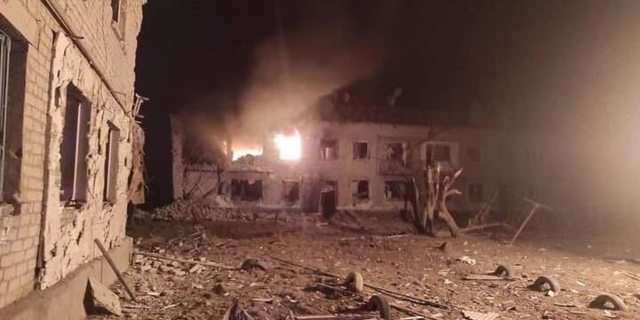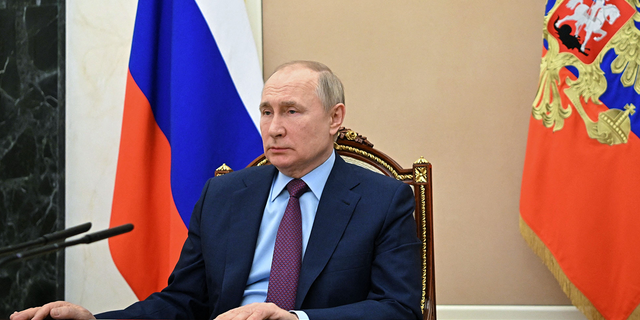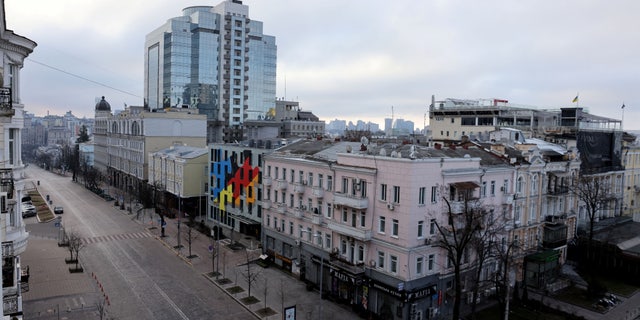by Andrew Mark Miller
Sanctions have failed to deter Putin for decades, experts told Fox News Digital, but the US kept using them.
Russian President Vladimir Putin’s invasion of Ukraine comes after decades of United States foreign policy failing to curb his military aggressions, which experts tell Fox News emboldened Putin over the years leading up to the invasion of Ukraine.
"Putin feels pretty emboldened," Retired CIA Senior Clandestine Services Officer Dan Hoffman told Fox News Digital on Saturday. "He won wars in Chechnya, Georgia, Ukraine and Syria. That's four big ones."
 |
| Several buildings in Starobilsk within the Luhansk Oblast region of Ukraine show significant damage because of shelling, according to images shared by the State Emergency Service of Ukraine. (State Emergency Service of Ukraine) |
Over the course of those four wars, the United States leveled various sanctions against Russia that failed to deter the country from future aggressions, which Hoffman explained is further proof, in addition to the recent sanctions from the Biden administration that failed to stop Putin’s invasion in Ukraine, that sanctions are ineffective against Russia.
"I’ve said that all along," Hoffman said when asked about the perception that sanctions are not enough to deter Putin. "It’s an easy thing that makes you feel good but it does nothing to influence Vladimir Putin’s calculus. He doesn't care."
"Absent concurrent diplomacy and expeditious use of our military tools, sanctions don’t do it," Hoffman added.
Putin’s aggressive actions against European neighbors as the leader of Russia traces back to the 2000s when Russia launched a devastating cyberattack against the neighboring NATO nation of Estonia and sent troops into Chechnya.
"I have been arguing for a long time that the more Western members of NATO did not take the experiences of the newer Eastern members as seriously as they should have," former Estonian President Toomas Hendrik Ilves, who was in power during the cyberattack in 2007, recently said. "And now, 15 years later, they have to face up to the consequences of not really believing what the Eastern members were saying."
UKRAINE-RUSSIA WAR: RUSSIAN TROOPS UNDERFUNDED, EQUIPMENT SUB-PAR, ACCORDING TO REPORTS
In 2008, Russia sent troops into the former Soviet republic of Georgia along the Black Sea in a move that Russia called a "peace enforcement operation" similar to the description Putin used of his invasion into Ukraine this month which he called a "peacekeeping operation."
 |
| Russian President Vladimir Putin attends a meeting with Russian Defence Minister Sergei Shoigu at the Kremlin, in Moscow on February 14, 2022. (Photo by Alexei Nikolsky/Sputnik/AFP via Getty Images) |
"No one was willing to go to war for Georgia," Mark Galeotti, senior non-resident fellow at the Institute of International Relations Prague and an expert on modern Russian history, said about the conflict to History.com in 2018. "This was a time in which no one really wanted to provoke Russia. [Dmitry] Medvedev was president, and particularly American policy was to essentially hope that this could be leveraged into something more positive. So…to a large extent, Georgia was left on its own."
In 2014, during the Obama administration, Russia invaded and annexed the Crimea region of Ukraine as well as the Donbas region of the country and were slapped with mild sanctions on Putin and his associates by the United States.
"In hindsight, one wonders, would Crimea and the Donbass wars have happened if the West had been more robust in its response to Georgia?" Galeotti said.
Putin also flexed his military power during the Trump administration sending troops into Syria to support President Bashar al-Assad’s efforts to combat ISIS and quell a civil war that significantly increased tensions with the United States and also led to sanctions against various Russian entities.
So far in 2022, sanctions levied by the Biden administration and Russia have failed to deter Putin from continuing his military advance into the Ukranian capital of Kyiv.
"The Biden administration said we’re not going to sanction them preemptively because we won’t have anything to do if he invades," Hoffman said. "In other words, they were saying he won’t invade because he knows he’s going to get sanctioned and we’re going to assist the Ukrainians with all types of military equipment which is what we’re doing. We’re sanctioning Russia and providing military assistance to Ukraine. So clearly that didn’t deter Vladimir Putin. So that was an ignorant policy and we’re paying a price for that."
 |
| A deserted street is seen after Russia launched a massive military operation against Ukraine, in Kyiv, Ukraine February 26, 2022. (Reuters/Umit Bektas) |
Rebekah Koffler, former Defense Intelligence Agency officer and the author of "Putin’s Playbook: Russia’s Secret Plan to Defeat America", told Fox News Digital that Putin has been successful at outsmarting the United States dating back to his first days in office roughly 20 years ago.
"It's not so much that we acquiesced, although we did a couple of times, it’s that we were fooled," Koffler said. "Putin kept fooling our leadership."
HOFFMAN AND SOAMES: STOP PUTIN NOW, AS CHURCHILL WOULD WARN, OR WEST WILL FACE THE CONSEQUENCES
Koffler explained that Putin used his training from the KGB to disarm and deceive U.S. presidents including in the 2000s where she says he "put a whole act on" with former President George W. Bush by insisting he was a man of deep Christian religious conviction.
In terms of the United States acquiescing to Russia, Koffler outlined multiple ways that the Obama administration deferred to Russian influence including the highly criticized viral moment where Obama could be overheard telling Russian President Dmitry Medvedev he would have "more flexibility" on missile defense negotiations after his next upcoming election.
The Obama administration was also criticized for not pursuing stricter action against Syria’s chemical weapons program in an attempt to assuage Russia.
Obama also mocked former presidential candidate Mitt Romney during a debate in 2012 when Romney said that Russia was the biggest geopolitical threat that America faced at the time.
"A few months ago when you were asked what’s the biggest geopolitical threat facing America, you said Russia, not al-Qaeda," Obama said during the third presidential debate between him and Romney in October 2012. "And the 1980s are now calling to ask for their foreign policy back because the Cold War’s been over for 20 years."
"The '80s called and we didn’t answer," Romney said this week in reference to the debate exchange.
Koffler told Fox News that the United States’ "failure to understand" their opponent as it relates to Putin has led to "bloodshed in Ukraine."
"And all Biden does is keep talking about the sanctions," Koffler said.
Andrew Mark Miller is a writer at Fox News. Find him on Twitter @andymarkmiller and email tips to AndrewMark.Miller@Fox.com.
Source: https://www.foxnews.com/politics/russian-invasion-how-the-west-failed-over-decades-of-recent-history-to-hold-putin-back
No comments:
Post a Comment